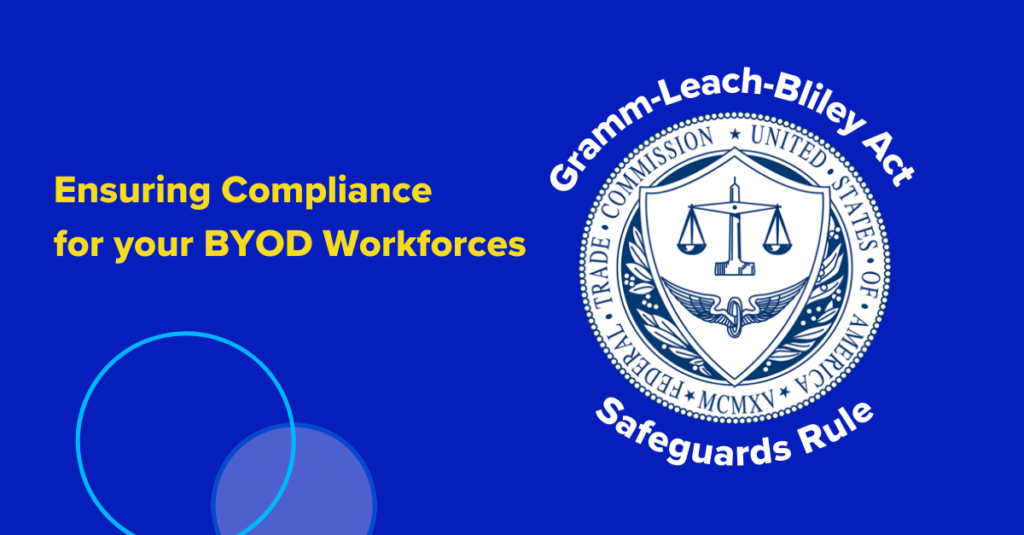Ensuring Compliance: Understanding the FTC’s Safeguards Rule and Its Challenges for Remote Work

The Federal Trade Commission’s (FTC) recent enhancement of the Gramm-Leach-Bliley Act (GLBA) Safeguards Rule introduces a critical requirement: businesses must notify the FTC within 30 days of discovering a data breach affecting 500 or more consumers. This heightened focus on information security and timely breach reporting aims to protect consumers’ nonpublic personal information (NPI), particularly in the financial sector.
The Importance of the Safeguards Rule
The GLBA Safeguards Rule mandates that financial institutions implement comprehensive information security programs to protect customer information. The rule’s recent updates reflect the evolving threat landscape, especially amidst the recent increase in cyber-attacks and data breaches. Key provisions include:
- Enhanced Security Measures: Financial institutions must implement robust information security protocols to protect customer data from unauthorized access and theft.
- Risk Assessments: Financial institutions must perform regular risk assessments to identify and mitigate potential new threats.
- Employee Training: Financial institutions must train their staff to recognize and respond to security threats effectively.
- Service Provider Oversight: Financial institutions must monitor their service providers to ensure that they meet the agreed-upon information security requirements.
Challenges in the Remote Work Era
Remote work is now the norm, and it has introduced new security challenges. Employees’ ability to access sensitive information from various locations and devices increases the risk of data breaches. Traditional, on-premises security measures may be inadequate, thus necessitating advanced, flexible solutions to effectively safeguard data.
The shift to remote work significantly impacts the implementation of the FTC’s Safeguards Rule. Here are some key challenges:
- Information Security Across Distributed Networks
- Challenge: How to ensure information security in home environments where network security is typically weaker?
- Impact: Increased risk of data breaches due to less controlled network settings.
- Device Management
- Challenge: How to manage and secure the wide array of personal devices used by remote workers?
- Impact: Higher chances of unauthorized access and data leakage.
- Activity Logging
- Challenge: How to monitor user’s activity and detect unauthorized access given the wide array of personal devices used by remote workers?
- Impact: Increased risk that unauthorized access will not be detected in a timely manner.
- Compliance Monitoring
- Challenge: How to continually monitor compliance with security policies given the wide array of personal devices used by remote workers outside of the office?
- Impact: Increased risk that security configurations “drift” and become less secure over time given the number of personal devices and work locations.
How Venn Enhances Information Security and Compliance for Remote Work and Securing Personal Devices
Venn provides comprehensive security solutions tailored to the needs of remote work environments to ensure compliance with the FTC’s updated Safeguards Rule. Here is how the Venn platform supports compliance:
- Data Encryption: Venn encrypts all data at rest and in transit, significantly reducing the risk of data breaches.
- Secure Access Controls: Multi-factor authentication and role-based access controls ensure that only authorized users can access sensitive information.
- Device Management: Venn offers robust device management, enabling monitoring and control over all work data on BYOD or unmanaged devices accessing corporate data.
- Device and Data Security: Venn secures and segregates the work environment and work data on BYOD, unmanaged and managed devices. Activity within the work environment (e.g., Venn’s Secure Enclave) is logged and monitored. The work environment can be rendered unreadable in the event of a device’s insecure configuration, suspicious user activity or a remote worker’s termination.
- Compliance Reporting: Automated compliance reporting features simplify the process of detecting and addressing device security configuration drifts.
The Venn Advantage
Venn uniquely secures the BYOD work environment for security and compliance-driven organizations with remote workers. Instead of using virtual desktops or buying, managing and shipping laptops, Venn provides a simpler and less costly solution.
With Venn, work lives in a company-controlled Secure Enclave installed on the user’s computer, where all data is encrypted and access is managed. Work applications run locally within the enclave – visually indicated by the Blue Border™ – where business activity is isolated and protected from personal use on the same computer. Similar to an MDM solution, but for laptops – remote work can now easily be secured on any PC or Mac without VDI.
Conclusion
The FTC’s Safeguards Rule underscores the necessity of robust data protection measures, especially in remote work settings. Venn is dedicated to helping businesses navigate these challenges, ensuring compliance and protecting customer data. Partnering with Venn equips financial institutions with the tools and expertise needed to maintain security and regulatory compliance in today’s dynamic digital landscape.
For more information on how Venn can enhance your remote work security and ensure compliance with the FTC Safeguards Rule, contact us today.

Scott Lavery
SVP Marketing
More Blogs


